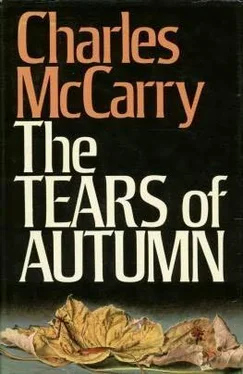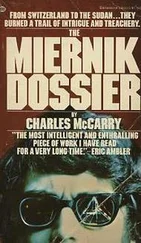Christopher went on speaking, as if prolonging the joke. “It was Benshikov who suggested a professional rifleman for Dallas, you know. Do wouldn’t tell him the details, just that he wanted an assassin.”
Ruiz read the label on the empty vodka bottle.
“Truthfully, at the time, I thought they had chosen the wrong man-not you, the assassin,” Christopher said. “He was so unstable.”
Ruiz seized the bottle by the neck and tapped on the table with it; outside, some of Nsango’s men were drumming and Ruiz tried to reproduce the rhythm, which was almost as complicated as speech.
“Oswald was insane,” he said. “But perhaps that’s what was needed.”
Christopher lifted his eyebrows. “Did you imagine he could succeed?” he asked.
“No. That’s why I was permitted by my own people to go ahead with the contact. They regarded it as a harmless favor to the Vietnamese-a credit for the future when we might want something from them. It wasn’t a high-level decision. I can’t imagine who had the balls to pass the word to Fidel after Oswald actually shot Kennedy. Naturally the Americans suspected us. A lot of people in Havana must have been very, very nervous.”
“Your people had no misgivings?”
Ruiz waved a hand. “It’s the old rule-the result justified whatever risk there might be. They thought even an unsuccessful attempt to kill Kennedy would have an important propaganda effect. To show he wasn’t safe in his own country.”
“Yes, but Oswald himself was a risk. I don’t know how you avoided terrible handling problems.”
“I handled Oswald very little, Charron. The contact was peculiar. He was such an outsider, such a clown. Our people in Mexico wouldn’t let me take him to a safe house, even. I spoke to him for perhaps an hour, in the Alameda, between planes.”
“But it was you who brought him to Mexico.”
“Yes, and I who suggested him to Do Minh Kha. I had his dossier with me in Hanoi, it came out to me in the pouch with a lot of other low-level stuff. One of our agents in New Orleans had assessed Oswald. He was trying to draw our attention there with that ridiculous thing of passing out pro-Castro leaflets on the street. We approached him. He offered to train and lead freedom fighters in Latin America. We pretended interest. Our man told him he’d have no problem getting a transit visa for the USSR at the Cuban consulate in Mexico City. The idea was that he’d stay in Havana, but the FBI and the CIA and all the others Oswald thought were watching him would think he’d redefected to Russia. Are you following?”
“Yes.”
“Then you see the pattern. Oswald had a tremendous fight with our consul in Mexico City, a man named Azque, when he wouldn’t issue the visa with no questions asked. Azque thought he was rabid.”
“Yes, I’d heard that. He also got into a sweat with the people at the Soviet embassy. They reported it to Center.”
“Did he? I’m glad I didn’t know that. The Russians didn’t want any part of him, naturally. No one did, poor fool.”
“How did you make contact?”
“Telephone. We’d given him a time schedule for the call and a recognition code. We told him to stay at the Comercio, it’s a dump. He hung about for two or three days and I had him surveilled. He was clean. So I called him up. He made the meeting in the park that same evening without any hesitation, precisely on time, hair all combed.”
“I hope you didn’t wear your uniform.”
“No-suit, tie, briefcase. I let him see a pistol under my coat. I gave him no identification. I don’t know what he thought I was. I played it very serious.”
“Like a Russian?”
“He may have thought that. I told him nothing. He made a point of not asking.” Ruiz made a comical face. “He wanted to look like a professional. He was very eager to be treated with respect. I obliged.”
“How did you lay the mission on him?”
“You have to understand I never thought he’d go through with it. I just gave it to him cold: when Kennedy is in Dallas in the last week of November, kill him. Use a rifle. Wear gloves. Abandon the weapon and walk away.”
“How did he react?”
“He was calm, casual. When I told him he’d change history he jumped a little and gave me a funny look, as if I’d touched him in the wrong place.”
Ruiz was enjoying his anecdote. He was smiling now and searching Christopher’s face for reaction.
“I mentioned plastic surgery, a new identity, a career of doing the same sort of thing in the future,” Ruiz said. “Amateurs really believe such things are possible.”
“And you promised to get him out after the shooting?”
“Of course. He wasn’t the kind who wanted to die. He was all fantasy. He imagined himself in a Socialist country, famous with all the secret people. It was a matter of letting him smell the life he’d always wanted. Respect, trust-his greatness acknowledged.”
“Weren’t you afraid he’d panic when you didn’t show up?”
“Once again, I had no idea he’d succeed. I thought he might try and be killed by the security forces. It was logical that that should happen.”
“Even failing, he might have talked.”
“Never. He wasn’t the type. We would have broken him, or the Russians. But not the Americans. It would have been a federal case. The FBI doesn’t torture people. In any case, they would have seen he was crazy. If he’d mentioned me, the FBI would have thought I was another of his fantasies.”
“You thought all that out at the time?”
“Frankly, no. But afterward it was plain. It was Oswald who chose the meeting place for after the assassination-that movie house. The Texas Theater? He said it would be easy for me to remember. A movie house. That was the amateur.”
“He wanted you to meet him there?”
“Oh, yes. He became very brisk-told me what sort of car to get for the escape, recommended a used-car dealer, drew a map of the routes south. He said we’d be across the border into Mexico before the American police recovered from the shock. I agreed with everything, as if he were a genius.”
“Money?”
“I didn’t offer him any-it would have been fatal. He wanted to prove his value. The operation cost nothing. He even had his own rifle and ammunition.”
“He must have wanted communications with you.”
“Certainly. I told him to rent a post office box at the Terminal Annex in Dallas when he was ready to go, and send me its number. I gave him an accommodation address in Mexico.”
“Did he?”
Ruiz laughed. “Yes. He wrote the number of the box on a piece of paper and circled the two middle digits. The number was 6225. I realized after the assassination that 22 was the day in November on which he intended to kill Kennedy. And so he did.”
“That must have been happenstance, the box number.”
“Maybe. When I saw Oswald in Mexico City, he had a clipping from a Dallas newspaper with him, saying that Kennedy would be in Dallas on November 21 and 22. Those were the dates the Vietnamese had chosen-Do Minh Kha gets the American papers too. Oswald just wanted to tell me which day, so I’d be there to arrange his getaway. You know what these fools are like-they imagine a great secret apparatus exists, able to do anything. It’s a good thing for us that they do believe it.”
“If he’d already clipped the story, he might have gone ahead with the shooting anyway.”
“It’s possible,” Ruiz said. “He’d had the idea for a long time. All I did was give him a rationale. After he talked to me, he was doing it for the revolution, entering history. I think that would have been important to him-to have his act known by the men in the apparatus. That way, he wasn’t just a cheap little nut, he was the avenger of the masses.”
Читать дальше












